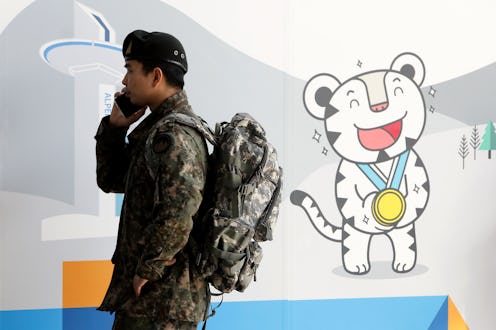News
North Korea Is Joining South Korea's Winter Olympics & Here's Why That's HUGE

Officials announced Tuesday that North Korea will send a delegation to the Winter Olympics in South Korea. It'll be the first meeting between the two rival countries in over two years, and yet the North's human rights abuses, nuclear weapons program and status as an international pariah has many people wondering: Why is North Korea allowed in the Olympics?
It's a valid question, because it isn't unheard of for the International Olympic Committee to ban countries over politics. At the 1920 Olympics in Antwerp, for instance, the countries considered to be the aggressors in World War I — Germany, Austria, Hungary, Bulgaria, and Turkey— were all banned from the games. Similarly, Germany and Japan were prohibited from competing in the first Olympics games after World War II due to their roles in starting that war.
In other cases, countries have been shut out of the Olympics simply due to their own odious domestic policies. Most notably, the IOC banned South Africa from the Olympics for 21 years due to the country's apartheid policies. Rhodesia was banned in 1972 for similar (though also more complex) reasons.
Given all of that, why was North Korea — a country that Humans Rights Watch calls "one of the most repressive authoritarian states in the world" and which has pursued nuclear weapons technology in violation of multiple international agreements — invited to the winter games?
The answer isn't entirely clear, and Bustle has reached out to the IOC for clarification on its criteria for banning countries. There are several explanations for the decision that seem plausible, though.
For one, North Korea will be sending more than just athletes to the games. High-ranking officials from country will also be in attendance, and during the games, they'll be having political talks with their southern counterparts, according to USA Today. That's significant: Tensions run extremely hot between the two countries, their relationship has been steadily deteriorating for years, and a (hypothetical) conflict between them is generally seen as one of the most likely catalysts for a nuclear war.
In other words, the Olympics will offer a low-key opportunity for a diplomatic breakthrough between the two countries — and in that light, the IOC's decision to invite North Korea makes a lot more sense. The Olympics, after all, are designed to bring counties together — and it's hard to argue that improved relations between North and South Korea would be a bad thing.
“We welcome the discussion which will take place on Wednesday between the governments of the Republic of Korea (ROK) and the Democratic People’s Republic of Korea (DPRK),” an IOC spokesman told Reuters on Monday.
It's also worth noting that although the IOC has banned countries for strictly political reasons in the past, it has more recently done this over controversies specifically related to sports. Russia, for instance, is prohibited from competing in 2018 games due to its state-sponsored doping program. Afghanistan was banned in 2000 because the Taliban government refused to let female athletes compete, and the IOC didn't invite Kuwait to the 2016 games after the country passed a law allowing government interference in the country's Olympics federations.
In all of those instances, the IOC acted in response to policies that, in its eyes, directly threatened the integrity of games themselves. The Olympics are meant to be a fair, open athletic competition between countries, and although there are plenty of things to protest about North Korea, those things generally don't have anything to do with sports, and thus wouldn't interfere with the Olympics' broader mission.
So far, only two North Korean athletes — a figure skating pair — have qualified for the 2018 games. As such, the negotiations that will take place between North and South Korean officials have the potential to be much more consequential than the North's participation in the games themselves. Better relations between the two countries would be to everybody's benefit, and for that reason alone, it's no surprise that the IOC invited North Korea to participate in the 2018 games.